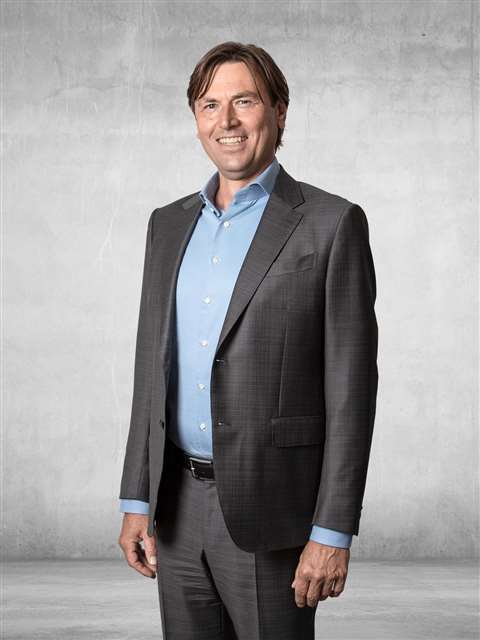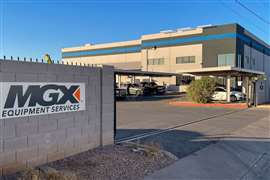Interview: HKL’s ‘undaunted optimism’
25 September 2020
Despite it being a challenging year on account of the Covid-19 pandemic, HKL Baumaschinen is demonstrating its “undaunted optimism” with plans to open five new depots during 2020, the company’s 50th anniversary year.

The new depots will be located in the company’s home market of Germany – in Berlin, Dresden, Forchheim, Fulda and Hamm.
Proximity to the customer has been a key concern in choosing the locations of the new depots, according to the company’s CEO Kay Städing; “Our goal is that the customers can get to us quickly and without detours.”
While the products offered by each depot will vary according to the specific needs of customers in each location, they will all supply general equipment, such as mini excavators, wheeled loaders and compaction equipment. The new depots will also have shops for products that are required on a daily basis, such as tools and consumables.
Depot network
Speaking generally about HKL’s network, Städing says, “The larger centres in strong economic regions offer an even larger range of products and services. And for special market requirements there are the competence centers for construction site modular space systems, access platforms and power generators.”
HKL is also present in Poland and Austria, and while no new locations are planned for Poland (where there are currently seven depots), the company is looking to expand its network of six depots in Austria.
“HKL has been present in several countries in the past decades,” says Städing. “However, experience has shown that concentrating on Germany, Austria and Poland is the most efficient way for us.”
Making history
Having studied business administration, Städing joined HKL in 1990, twenty years after his father, Claus Städing, founded the company with two partners, in 1970.
“They started with the rental of construction machines and equipment. That was pretty visionary in those times and it was implemented in a really progressive way,” says Städing.
Soon after, they started offering servicing to enhance machine dependability and availability; “Increasing the benefit to the customer was the main concern with all these steps,” says Städing.

Strong growth
The range of services offered by HKL grew steadily, and the company enjoyed particularly strong growth after the reunification of Germany, during which time HKL built trust with customers in major Eastern German cities.
Städing says, “We continued to expand until, in the end, we had established a network of more than 150 centers all over Germany.”
In 2019, HKL generated revenues of €380 million, putting it in 34th position in this year’s IRN100 ranking of the world largest rental companies, published in the June issue of IRN.
HKL now employs more than 1,400 people and has in excess of 80,000 products in its rental range. The company also has a large inventory of used and new equipment for sale.
A changing market
The rental market is in constant flux, according to Städing, but he says what is different now is the pace at which the market is changing, and how customer behaviour is shifting too.
New digital communication channels have enabled more targeted communication and they make information about products available at any time. Digitalisation also has the effect of making things more transparent, says Städing.
“HKL has done a lot recently to digitalise its processes. And we will continue to follow that path strictly. However, we are convinced that personal contact will still play a major role in the future. The business consists of people with different needs, whom we want to reach through different channels.”
The role of rental
Over the past 50 years, the role of rental companies has also shifted from simply supplying equipment to becoming total solutions providers.
“Providing rental machinery is one thing; the other is add-ons or simplifications to make it easier for the customer to perform their own tasks,” says Städing.

This includes making communications simpler by minimising the number of people the customer has to contact; offering easy and flexible order processes; and ensuring equipment is well suited to a given task, based on past experience.
In conjunction with this, HKL’s rental fleet has evolved; “It is the primary task of a good rental company to permanently address the changing requirements of the market,” says Städing. “This means new ideas have to be developed and useful additional offers must be created.”
Expanding fleet
HKL originally supplied only construction machines, but then expanded into modular space. This was followed by telescopic handlers, vehicles, boom lifts and power generators.
“Aside from the general equipment, specific competence centres were established to be able to offer expert knowledge in a focused way,” says Städing.
This requires constant investment, in both the fleet and rental depots.
Capex plans
Although Städing does not offer any figures, when asked about the impact of Covid-19 on HKL’s fleet investment plans he says, “Like all businesses we had to readjust our plans for 2020 at the beginning of the year. The fact that nothing was known about the course and the duration of the situation made a readjustment for the future especially difficult.”
And looking further ahead to 2021; “This of course completely depends on how the current business year is going. If the public sector and trade and industry authorise and execute investments, we will of course be supporting our customers with all our strength and power in 2021.”
On the topic of hybrid and electric equipment, Städing says HKL closely monitors the development of alternative drives and asks its customers about their needs; “There is already some promising electric equipment available in the HKL rental park. However, currently these are smaller devices and tools. The market will definitely open further in the coming years and we will then naturally offer the best solutions.”
Adapting to Covid-19
Speaking about the effects of the Covid-19 pandemic, Städing says the company reacted quickly; “As the lock-down measures were implemented step by step, we as a service provider with personal contact with our customers were able to assess pretty well what we had to do.

“Fortunately, as a company dealing mainly with commercial customers, we were not hit as hard by the cuts. However, we did have to organise and learn a lot.”
HKL put in place the necessary IT infrastructure for much of its staff to work from home, which Städing says was critical to allowing the company to continue operating during the peak of the crisis.
Meanwhile, employees who had to continue working in the depots were protected in accordance with government guidelines, with the implementation of mask wearing and disinfection stations. Also, customer contact was limited to phone calls.
Open for business
HKL’s entire depot network remained open, except in Austria where the lockdown meant they had to be closed for a period.
Regarding the impact on revenues, Städing says, “The crisis of 2008/9 definitely had a lesser impact in the real economy on our company than the current pandemic. However, I do think that we are not yet able to seriously assess this. It will certainly continue to occupy us in all areas.”
During the peak of the pandemic, there was a surge in online traffic and telephone calls; “However, we do have a pretty good contact rate via these channels anyway, therefore the increase wasn’t remarkable,” says Städing, adding that he expects there to be a higher level of digital communication in future, as a result of the pandemic.
Also, one positive outcome of the pandemic is that it will enable HKL to organise itself more efficiently going forwards, according to Städing, because the crisis has shown up areas of inefficiency within the business.
“We will try to make use of the opportunities this challenge presents to us,” Städing says. “In any case, we are ready.”



